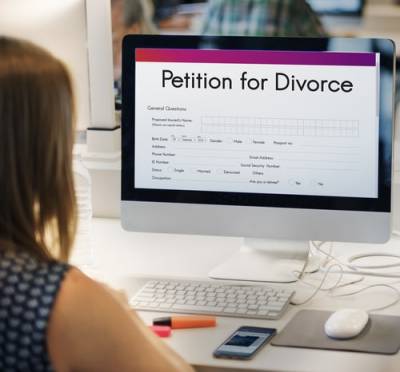Recent Blog Posts
Is it a Good Idea to Use Online Legal Services for Divorce in Illinois?
 Now more than ever, technology allows us to do all kinds of things online. Activities that were only possible face-to-face just ten years ago have now become ubiquitous in the online world. Among the explosion of online utilities now available is a wide variety of legal services that allow users to do anything from creating a will to getting a divorce.
Now more than ever, technology allows us to do all kinds of things online. Activities that were only possible face-to-face just ten years ago have now become ubiquitous in the online world. Among the explosion of online utilities now available is a wide variety of legal services that allow users to do anything from creating a will to getting a divorce.
These services advertise themselves as easy, less expensive alternatives to in-person legal counsel from a qualified attorney. Although in some cases this may be true, it is certainly not always wise to use online divorce technology, and doing so may end up costing you significant amounts of time and money in the long run.
Is it Ever a Good Idea to Use Illinois Divorce Websites?
There are many reasons that a “do-it-yourself” divorce may seem appealing. Low costs, faster processing time, and fewer complications all sound great - especially if you are trying to separate from a hostile spouse as soon as possible.
How Does DNA Paternity Testing Work in Illinois?
 For children who are born to married parents, establishing paternity is easy: The mother is obviously the mother, and the mother’s husband is assumed to be the father. However, when two people are not married, establishing the parentage of a child can pose some challenges.
For children who are born to married parents, establishing paternity is easy: The mother is obviously the mother, and the mother’s husband is assumed to be the father. However, when two people are not married, establishing the parentage of a child can pose some challenges.
Parents must seek to establish legal paternity for their child another way. Because Illinois law is deeply concerned with the wellbeing of a child and seeks involvement and support from both parents, courts will often issue Orders of Paternity in order to establish who is the child’s legal father. Before a court does this, however, it will need to determine who is the father; for this reason, genetic testing is often used.
What Is Genetic Testing?
We receive our genes, or genetic material, from two people: Our father and our mother. DNA testing compares the genes of a child to the genetic material of his or her parents. This DNA can be obtained in a variety of ways, including blood, hair, bone, or other body fluid samples, but the most common method of gathering DNA is through a simple cheek swab. This does not hurt a child.
What is the Difference Between Assault and Battery in Illinois?
 Illinois criminal law divides criminal conduct into two main categories: Crimes against property and crimes against a person. If a thief broke into a home and stole money, but nobody else was home, then the thief committed an offense against property. However, if the same thief confronted someone on the street with a gun and stole their wallet, the crime is robbery and is considered an offense against a person.
Illinois criminal law divides criminal conduct into two main categories: Crimes against property and crimes against a person. If a thief broke into a home and stole money, but nobody else was home, then the thief committed an offense against property. However, if the same thief confronted someone on the street with a gun and stole their wallet, the crime is robbery and is considered an offense against a person.
Assault and battery are both offenses against a person. Because assault and battery are often discussed in the same context, many people believe they always happen together or are the same crime. However, assault and battery are two distinct legal offenses that describe different behaviors and carry different penalties.
What is Battery?
The crime of battery is committed when one person, without legal authority or justification, intentionally causes bodily harm to another person or makes physical contact in a way that insults or provokes the victim. Serious physical harm does not have to take place in order for someone to be successfully prosecuted with battery. A single slap, punch, or even finger poke in the chest could be considered battery.
What is the Best Way to Tell Our Children We are Getting Divorced?
 Even under the best of circumstances, Illinois parents getting divorced with young children at home face a number of difficult challenges. In addition to the loss of the relationship, parents must figure out how to tell the children about the divorce and attempt to help them process their emotions.
Even under the best of circumstances, Illinois parents getting divorced with young children at home face a number of difficult challenges. In addition to the loss of the relationship, parents must figure out how to tell the children about the divorce and attempt to help them process their emotions.
Professionals in divorce and child psychology have developed strategies for minimizing the negative impacts of divorce on children and families. With careful planning and a commitment to avoid blame and hostility, parents can help children through the transition so they may continue to have healthy, loving relationships with both adults.
Practice the Conversation Together First
Experts suggest planning and practicing what you will share with your children ahead of time. Choosing the right words can be difficult in the heat of the moment. A practiced conversation can help parents avoid conflict and strong emotional reactions, allowing them to focus on the child’s reaction and needs.
Spousal Support for Homemakers and Stay-at-Home Parents in Illinois
 In an ideal world, every parent would easily be able to find the perfect balance of work and family life. In reality, however, when couples decide to have children, they must make difficult decisions about paying for childcare and earning a liveable income. Many times, couples decide that one parent will stay home to care for the children while the other parent pursues a career.
In an ideal world, every parent would easily be able to find the perfect balance of work and family life. In reality, however, when couples decide to have children, they must make difficult decisions about paying for childcare and earning a liveable income. Many times, couples decide that one parent will stay home to care for the children while the other parent pursues a career.
This arrangement has its benefits and drawbacks. One potential downside is that it leaves the homemaking parent with little or no personal income. If the relationship sours and the homemaker contemplates divorce, he or she may feel trapped, unable to afford the legal representation they need, and worried about future finances. However, Illinois recognizes the important contributions homemakers make to their family and society. In addition to child support, the law offers protection by providing for several kinds of spousal maintenance (formerly known as alimony).
What is the Difference Between Marital and Nonmarital Property?
 One of the most contentious issues in an Illinois divorce is the division of assets. Assets are considered either marital or nonmarital, but it is not always easy to determine which category an asset falls into. What if you owned a home before getting married and the mortgage was always in your name, but your spouse helped you make payments on it throughout the marriage? What if you inherited $10,000 from your grandfather, but placed it into a bank account that you shared with your spouse?
One of the most contentious issues in an Illinois divorce is the division of assets. Assets are considered either marital or nonmarital, but it is not always easy to determine which category an asset falls into. What if you owned a home before getting married and the mortgage was always in your name, but your spouse helped you make payments on it throughout the marriage? What if you inherited $10,000 from your grandfather, but placed it into a bank account that you shared with your spouse?
In this blog post, we will examine the difference between marital and nonmarital assets and the factors that can help a judge determine how assets are categorized. The terms “assets” and “property” mean the same thing and are used interchangeably. Keep in mind that this article is not meant to be legal advice and that the best way to obtain a satisfactory asset division in your divorce is to hire an experienced divorce attorney.
Understanding “Parenting Time” in an Illinois Divorce
 If you are a parent getting divorced in Illinois, you likely have questions about child custody. Many parents understandably worry about how a divorce will impact the amount of time they spend with their children. Some parents have additional concerns about how the other parent’s ability to care for the child appropriately. Regardless of your particular situation, if you are getting divorced in Illinois, it is important to understand Illinois laws regarding child custody and parenting time.
If you are a parent getting divorced in Illinois, you likely have questions about child custody. Many parents understandably worry about how a divorce will impact the amount of time they spend with their children. Some parents have additional concerns about how the other parent’s ability to care for the child appropriately. Regardless of your particular situation, if you are getting divorced in Illinois, it is important to understand Illinois laws regarding child custody and parenting time.
How is Parenting Time Decided in an Illinois Divorce?
Although we still use the term “child custody” to refer to general parenting duties after a divorce, this term is technically outdated. Illinois law now uses the term “allocation of parental responsibilities” to refer to parents’ decision-making authority and “parenting time” to refer to the time parents spend caring for their children.
When Can Your Child Be Charged as an Adult in Illinois?
 Illinois is known for its attention to the juvenile justice system. It was the first state in the country to create a separate justice system for those under the age of majority. This has been extremely important, as the juvenile court system often serves as a means for rehabilitating young people who are on the wrong path. This is different from adult criminal court in that there is a belief that children have more of an opportunity for change. However, there are still some instances in which a juvenile may be tried in adult criminal court. If you or a loved one were charged with a criminal offense in Illinois, it is important to understand what you may be up against.
Illinois is known for its attention to the juvenile justice system. It was the first state in the country to create a separate justice system for those under the age of majority. This has been extremely important, as the juvenile court system often serves as a means for rehabilitating young people who are on the wrong path. This is different from adult criminal court in that there is a belief that children have more of an opportunity for change. However, there are still some instances in which a juvenile may be tried in adult criminal court. If you or a loved one were charged with a criminal offense in Illinois, it is important to understand what you may be up against.
Juveniles Facing Charges in Adult Criminal Court
It’s important to note that there is never a time when a juvenile is required to be transferred to adult criminal court.
How Will Retirement Benefits or Pensions Be Handled in My Divorce?
 Many financial issues will need to be settled during a divorce case, and determining how to divide marital assets and debts will often be one of the primary concerns that spouses will need to address. In some cases, the property division process may be fairly straightforward, but it can become more complex when a couple owns multiple types of financial assets. Retirement benefits are one form of property that can complicate divorce proceedings, and spouses will want to understand their rights regarding these assets and the methods they can use to avoid financial penalties.
Many financial issues will need to be settled during a divorce case, and determining how to divide marital assets and debts will often be one of the primary concerns that spouses will need to address. In some cases, the property division process may be fairly straightforward, but it can become more complex when a couple owns multiple types of financial assets. Retirement benefits are one form of property that can complicate divorce proceedings, and spouses will want to understand their rights regarding these assets and the methods they can use to avoid financial penalties.
Dividing Retirement Assets
Spouses may save money in multiple types of retirement accounts, including employer-provided plans such as a 401(k) or an individual retirement account (IRA) that they have set up on their own. Even though these accounts may be in one spouse’s name, they will usually be considered marital assets if contributions were made to the account during a couple’s marriage. Fortunately, determining the value of these assets can be fairly simple, and the balance of an account may be divided between spouses during the divorce process.
How Can Cheating or Infidelity Affect My Divorce?
 There are many reasons why married couples choose to divorce, including disagreements about finances or how children should be raised. However, many of the most contentious divorce cases involve infidelity. When one spouse has been unfaithful, the other spouse may experience betrayal, anger, and sadness, making it more difficult to reach agreements during the divorce process. Because infidelity can be an important part of why a marriage may be ending, spouses will want to understand whether this issue will play a role in their divorce proceedings.
There are many reasons why married couples choose to divorce, including disagreements about finances or how children should be raised. However, many of the most contentious divorce cases involve infidelity. When one spouse has been unfaithful, the other spouse may experience betrayal, anger, and sadness, making it more difficult to reach agreements during the divorce process. Because infidelity can be an important part of why a marriage may be ending, spouses will want to understand whether this issue will play a role in their divorce proceedings.
Divorce and Marital Misconduct
Infidelity will be a highly consequential issue in a couple’s relationship, and because of this, spouses may expect that they will need to raise this issue during their divorce. However, there are only a few situations where this type of behavior may influence the decisions made during the divorce process. As difficult as it may be to ignore this issue, pointing out that a spouse who has cheated usually will not benefit the other spouse.





